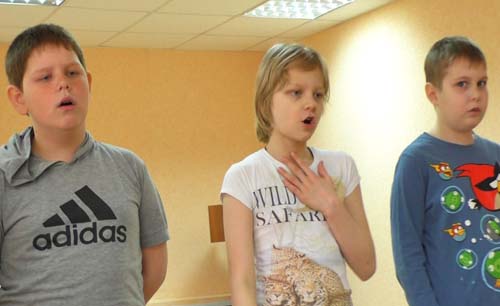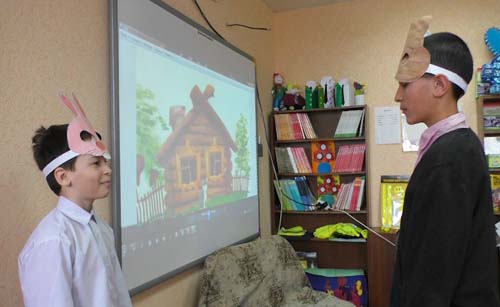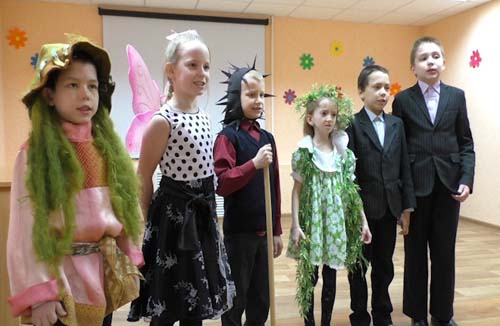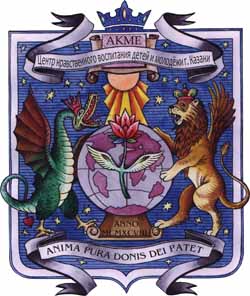
ACME
Association for Creative Moral Education
![]() Home
Home ![]() What is ZIPoPo
What is ZIPoPo ![]() Projects
Projects ![]() Trainings
Trainings ![]() Author and Founder
Author and Founder ![]() Gallery
Gallery ![]() Awards
Awards ![]() Publications
Publications ![]() Partners
Partners ![]() Contacts
Contacts
![]()
|
"I Am No Handicapped!" (Adaptation of Children With Speech Disorders)
View one of the videos (in Russian) This project involved the training of 25 students of the Kazan Boarding School #7 for children with speech disorders in the basics of acting, scriptwriting, directing and other skills necessary for film production. Project participants were able to make short feature films based on their own scenarios, inspired by difficult life situations when one has to make an important decision. Viewing recorded video data and its subsequent analysis, shooting new takes to correct previous errors, discussing the content of the videos, as well as jointly searching for positive solutions, based on high ethical principles, allowed students with disabilities to acquire and develop social skills, necessary for adaptation to their future adult life, strengthen their confidence, develop sympathy, create a sense of mutual support and positive attitude towards a healthy lifestyle, as well as help them fully and vividly express their feelings, which is difficult for them. One of the most acute problems of children with disabilities is the problem of their adaptation to future life. Children with disabilities are not ready for adult life, it scares them, putting before them challenges that seem impossible to them. As a result, many children with disabilities develop an inferiority complex, which is reflected in the fact that they will accept the worst conditions when choosing a job, a marriage partner, a place of living and even their lifestyle. Often children with disabilities lose their homes as a result of fraud scams, become victims of drug dealers; girls with disabilities may become targets of sexual exploitation. In addition, aggression, violence and brutality that are transmitted today through the mass media, including TV and movies, and through computer games, have a negative impact on the younger generation, especially on vulnerable souls of children with disabilities. There is an apparent lack of positive example, positive attitude to people, to the nature. Cases of aggression by school students towards their peers and other people become more frequent, as well as vandalism and cruelty towards animals. Loss of family values, substitution of moral principles by Law of Jungle, focusing on achieving pleasures and propaganda of base entertainment require adequate educational actions. Young person, especially the disabled one, needs to learn how to make proper, constructive choice of actions and behavior in general. To make this choice more meaningful, balanced and objective, a young person needs information, knowledge, skills, illustrative examples of the disastrous consequences of a negative resolution of difficult life situations and, on the contrary, constructive results of their positive solution. Rationale of the Project: The project involved training of students of the Kazan Boarding School №7 for children with speech disorders in the basics of acting, scriptwriting, film directing, cameraman skills and other skills necessary for the production of the movie. Participants made short fictional films on their own scenarios, performed roles in these movies, directed and filmed the videos. Also they viewed recorded videos and analyzed them, taking into account the errors, discussing the contents of videos, followed by joint search for positive solutions based on high ethical principles. All together this allowed children with disabilities to acquire and strengthen social skills, necessary for adaptation to future life. The ability to write a script promotes creativity and logical thinking, the emergence of dramaturgical skills, i.e. the ability to succinctly and vividly describe the situation, to see the depth of the relationships between the characters, to have a meaningful life task and identify ways of solving it. Acting, stage speech, mastering the basics of directing, as well as such useful for future life skills like shooting video, the art of composition, editing and producing a video – all this helped children with disabilities to fully and vividly present their feelings, the expression of which is difficult for them. Participation of children with disabilities in preparation and shooting the videos as writers, actors, directors and editors helped them as they acquired skills useful for their future life, to strengthen their confidence in themselves, their abilities and capabilities, to develop love and respect towards their families, as well as sympathy, mutual aid and support, and positive attitude towards life, people and nature. In addition, we showed the captured videos in the ordinary schools of Kazan and Tatarstan as an effective contribution to inclusive education. The project aimed at promoting the development of inclusive education in educational institutions of Tatarstan, education of young generation in the spirit of zero tolerance for neglect and superiority in relation to people with physical and intellectual disabilities, as well as strengthening of moral and ethical principles in children, teenagers and youth in general. Topics for Videos: 1. The ability to defend their point of view; 2. The importance of human dignity; 3. Chastity as a value; 4. The beauty of the soul is more important than the beauty of the body; 5. Honesty as one of the crowning glories of man; 6. The ability to stand up to a bully; 7. The right to make the best choice; 8. Life and social engagement as opposed to isolation; 9. How to avoid living in a virtual computer life; 10. Respect to elder people, to the family. Methods: It is known that interactive discussion involving media technics is among the most effective innovative methods in modern education and upbringing. Using methods of fostering critical thinking and case-technologies helps to strengthen reflexive mechanisms in formation of positive behavior of children with disabilities. Positive modeling of complex life situations in the form of social theatre, which is the playground for acquisition of cognitive experience, and elaboration of models of positive behavior are effective means to help education of children with disabilities, and they has proven their effectiveness.Results: 1. 10 scripts were written by the students of the Kazan Boarding School for children with speech disorders; 2. 10 videos were filmed and edited; 3. A DVD with 10 films was made and copied for all participants and their families, as well as for teachers, and also for disseminating in other schools of Kazan and Republic of Tatarstan; 4. School film festival for parents was held. 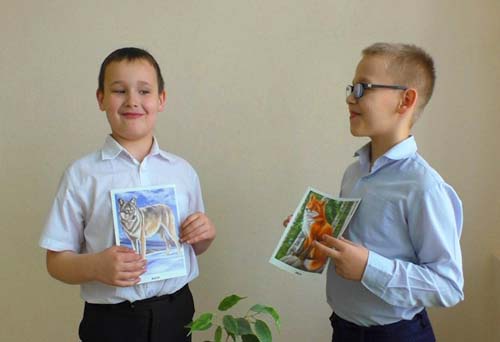  |
![]()
